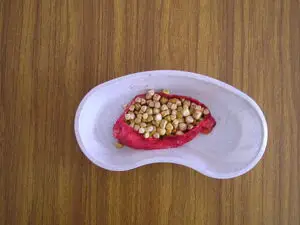
Gallstones can be a painful and uncomfortable condition to live with. They often require expensive and invasive surgeries to treat, but this isn’t the only option available. There are many ways to treat gallstones without resorting to surgery, and they may all be easier on your wallet as well. In this article, we will look at the top treatments for gallstones without surgery. We’ll explore the pros and cons of each treatment so that you can make an informed decision when it comes time to decide which one is right for you. Read on to learn more!
Dietary Changes for Gallstone Prevention
There are two types of gallstones: cholesterol stones and pigment stones. Cholesterol stones are more common and are made up of excess cholesterol in the bile. Pigment stones are made up of bilirubin, a byproduct of red blood cell breakdown.
You may be able to prevent gallstones by making changes to your diet. The following dietary changes may help reduce your risk of developing gallstones:
- eat a low-fat diet
- eat plenty of fruits, vegetables, and whole grains
- drink plenty of water
- avoid crash diets or fasting

Gallstones: What are they and how do they form?
Gallstones are small, hard deposits that form in the gallbladder. The gallbladder is a small, sac-like organ that stores bile, a digestive fluid produced by the liver. Bile helps break down fats in the intestine.
Gallstones can range in size from a grain of sand to a golf ball. Some people have just one gallstone, while others have many. Gallstones can cause pain and other problems if they block the tubes (ducts) through which bile flows from the gallbladder or liver.
Most gallstones form when there is too much cholesterol in the bile. Cholesterol is a type of fat found in food and made by your body. When there is too much cholesterol in the bile, it can harden into stones.
Other types of gallstones include pigment stones, which are made up of bilirubin (a waste product), and mixed stones, which contain both cholesterol and bilirubin.
The Difference between Gallstones and Kidney Stones
Gallstones and kidney stones may both be painful, but they are not the same condition. Gallstones are usually made of cholesterol and form in the gallbladder, while kidney stones are usually made of calcium and form in the kidney.
There are several key differences between gallstones and kidney stones:
- Location: Gallstones form in the gallbladder, while kidney stones form in the kidneys.
- Composition: Gallstones are usually made of cholesterol, while kidney stones are usually made of calcium.
- Treatment: Gallstones can often be treated without surgery, while kidney stones typically require more invasive treatment.
If you think you may have either gallstones or a kidney stone, it’s important to see a doctor so they can properly diagnose and treat your condition.

Gallstones Treatment: Medical Options
Gallstones are small, hard deposits that form in the gallbladder. The gallbladder is a small, pear-shaped organ located under the liver. The liver produces bile, a yellowish-green fluid that helps break down fats in the intestine. Bile is stored in the gallbladder and released when fat enters the intestine during digestion.
There are two types of gallstones: cholesterol stones and pigment stones. Cholesterol stones are made mostly of cholesterol, while pigment stones are made up of bilirubin, a substance produced when red blood cells break down. Gallstones can range in size from a grain of sand to a golf ball.
Most people with gallstones never have symptoms and do not need treatment. However, if gallstones block the bile ducts, they can cause pain in the upper abdomen or back and may require medical treatment or surgery to remove the gallbladder (cholecystectomy).
Some common medical treatments for gallstones include:
- Cholecystectomy: This is a surgical procedure to remove the gallbladder. It is often considered the most effective way to treat gallstones, and has a very high success rate. However, it is also a major surgery with associated risks and recovery time.
- Lithotripsy: This is a non-surgical procedure that uses sound waves to break up the gallstones into smaller pieces so that they can be passed more easily. It is less invasive than cholecystectomy, but has a lower success rate and may require multiple treatments.
- Medications: There are a number of medications that can be used to dissolve gallstones or help them pass more easily. These include bile acid sequestrants, bile salt binding resins, and enzymes. However, these medications are not always effective and may have side effects.

Gallstones Treatment: Home Remedies
There are a few simple things you can do at home to help treat your gallstones and avoid surgery.
- First, try to eat a healthy diet that includes plenty of fiber. This will help to keep your digestive system working properly and prevent new stones from forming.
- Second, drink plenty of fluids, especially water. This will help to flush out your system and break up any existing stones.
- Third, try taking a natural supplement like Chanca Piedra or Milk Thistle. These herbs have been shown to help dissolve gallstones and improve liver function.
- Fourth, avoid fatty foods and processed sugars. These can make your gallstone problem worse.
- Fifth, get regular exercise. This will help to keep your body healthy and prevent new stones from forming.
When to see a Doctor for Gallstones
Gallstones can be painful and uncomfortable, but they usually don’t require treatment. However, if you experience severe pain or other symptoms caused by gallstones, you may need to see a doctor.

Gallstone attacks often happen after a fatty meal and can last for several hours. If you have a gallstone attack, you may experience:
- Severe pain in your upper right abdomen that radiates to your right shoulder or back
- Nausea or vomiting
- Fever
- Yellowing of your skin (jaundice)
- Clay-colored stools
If you experience any of these symptoms, call your doctor right away. They will likely recommend that you come into the office for an evaluation.
The Different Types of Gallstone Treatment
There are several different types of gallstone treatment that do not require surgery. The first is oral dissolution therapy, which involves taking medications that dissolve the stones. This type of treatment typically takes several months to work and may not be effective for all types of stones. The second is shock wave lithotripsy, which uses sound waves to break up the stones so they can be passed through the body. This type of treatment is usually effective but can cause some pain and discomfort. The third is endoscopic retrograde cholangiopancreatography, which uses a special camera to remove the stones. This type of treatment is typically very effective but can be quite invasive.
The Pros and Cons of each Gallstone Treatment
There are four primary types of gallstone treatments: surgery, oral dissolution therapy, shock wave lithotripsy, and percutaneous removal.
Surgery is the most common and most effective gallstone treatment. It involves removing the gallbladder through a small incision in the abdomen. This procedure is typically safe and has a low risk of complications. Recovery from surgery takes about two weeks.
Oral dissolution therapy involves taking medication that dissolves gallstones. This treatment is less invasive than surgery, but it can take up to two years for the medication to work. Additionally, this treatment may not be effective for all types of gallstones.
Shock wave lithotripsy uses high-energy sound waves to break up gallstones so they can pass through the digestive system. This treatment is noninvasive and has a shorter recovery time than surgery, but it may not be effective for all types of gallstones.
Percutaneous removal involves making a small incision in the abdomen and using a special device to remove the gallbladder. This treatment is less invasive than surgery and has a shorter recovery time, but it may not be effective for all types of gallstones.
Which Gallstone Treatment is right for you?
There are a number of different gallstone treatment options available, and the right one for you will depend on a number of factors. Your doctor will likely recommend a course of action based on the severity of your condition, your overall health, and your preferences.
Some people with gallstones may only need to make lifestyle changes, such as eating a healthier diet and losing weight. Others may require medication to dissolve the stones or surgery to remove them.
If you have gallstones, talk to your doctor about which treatment option is right for you.
Conclusion
All in all, it is possible for those suffering from gallstones to find relief without undergoing surgery. Although the treatments mentioned here may not be as effective in some cases and should only be used under a doctor’s supervision, they are worth considering before resorting to surgical methods. With patience and diligence, you can restore your digestive health naturally so that you can enjoy greater well-being.


Wow, marvelous weblog format! How long have you been blogging for?
you make blogging glance easy. The whole look of your site is fantastic, let
alone the content! You can see similar: najlepszy sklep and
here sklep internetowy
Wow, superb blog format! How lengthy have you been running a blog for?
you make running a blog glance easy. The whole glance
of your web site is wonderful, let alone the
content material! You can see similar: ecommerce
and here sklep online
Please let me know if you’re looking for a article author for
your blog. You have some really good articles and I feel I would be a good
asset. If you ever want to take some of the load off, I’d love to write some articles for your blog in exchange for a link back to mine.
Please shoot me an email if interested. Cheers! I saw similar
here: sklep internetowy and also here: sklep internetowy
Heya i’m for the primary time here. I came across this board and I in finding It
truly useful & it helped me out much. I hope to present something back and aid others such as you
aided me. I saw similar here: Sklep internetowy
I was curious if you ever considered changing the structure of your blog?
Its very well written; I love what youve got to say. But maybe you could a little more
in the way of content so people could connect with it better.
Youve got an awful lot of text for only having one or
two images. Maybe you could space it out better? I saw similar
here: Sklep online
Hi! Do you know if they make any plugins to assist with SEO?
I’m trying to get my blog to rank for some targeted keywords but I’m not seeing very good results.
If you know of any please share. Cheers!
You can read similar article here: Sklep online
Hi! Do you know if they make any plugins to assist with Search Engine
Optimization? I’m trying to get my blog
to rank for some targeted keywords but I’m not seeing
very good results. If you know of any please share.
Thank you! You can read similar blog here: Sklep online
Wonderful beat ! I wish to apprentice while you amend your site, how could i subscribe for
a blog site? The account aided me a acceptable deal. I had been a little
bit acquainted of this your broadcast provided bright
clear idea
Hi would you mind stating which blog platform you’re using?
I’m going to start my own blog in the near future but I’m having a hard time selecting between BlogEngine/Wordpress/B2evolution and
Drupal. The reason I ask is because your layout seems different
then most blogs and I’m looking for something completely unique.
P.S My apologies for being off-topic but I had to ask!
Howdy! Do you know if they make any plugins to assist with Search Engine Optimization? I’m trying
to get my website to rank for some targeted keywords but I’m not seeing very good results.
If you know of any please share. Kudos! I saw similar text
here: List of Backlinks
Very good article! We will be linking to this great article on our site.
Keep up the good writing.
Hey there! Do you know if they make any plugins to assist with SEO?
I’m trying to get my blog to rank for some targeted keywords but I’m not seeing very good gains.
If you know of any please share. Thanks! I saw similar text here:
Link Building
wonderful submit, very informative. I ponder why the other specialists of this sector do
not understand this. You must continue your writing.
I’m sure, you’ve a huge readers’ base already!
I like the helpful information you provide in your articles.
I’ll bookmark your weblog and check again here regularly.
I’m quite certain I will learn plenty of new stuff right here!
Good luck for the next!
Wow, wonderful weblog structure! How long have you ever been blogging for?
you make blogging look easy. The total look of your web site is wonderful, as
smartly as the content! You can see similar here prev next and it’s was wrote
by Codi76.
Wow, marvelous blog format! How lengthy have you been blogging
for? you make blogging look easy. The full glance of your site
is great, let alone the content! I read similar here prev next and that was
wrote by Darline67.
Wow, incredible blog layout! How long have you been running
a blog for? you made running a blog look easy. The whole look of your
website is magnificent, let alone the content
material! You can read similar here prev next and that was
wrote by Jermaine93.